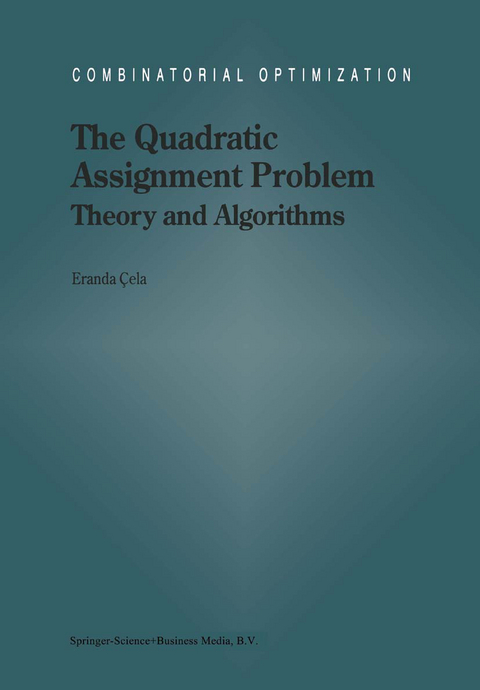
The Quadratic Assignment Problem
Theory and Algorithms
Seiten
2010
|
Softcover reprint of hardcover 1st ed. 1998
Springer-Verlag New York Inc.
978-1-4419-4786-4 (ISBN)
Springer-Verlag New York Inc.
978-1-4419-4786-4 (ISBN)
The quadratic assignment problem (QAP) was introduced in 1957 by Koopmans and Beckmann to model a plant location problem. Typical examples are the traveling salesman problem and a large number of optimization problems in graphs such as the maximum clique problem, the graph partitioning problem and the minimum feedback arc set problem.
The quadratic assignment problem (QAP) was introduced in 1957 by Koopmans and Beckmann to model a plant location problem. Since then the QAP has been object of numerous investigations by mathematicians, computers scientists, ope- tions researchers and practitioners. Nowadays the QAP is widely considered as a classical combinatorial optimization problem which is (still) attractive from many points of view. In our opinion there are at last three main reasons which make the QAP a popular problem in combinatorial optimization. First, the number of re- life problems which are mathematically modeled by QAPs has been continuously increasing and the variety of the fields they belong to is astonishing. To recall just a restricted number among the applications of the QAP let us mention placement problems, scheduling, manufacturing, VLSI design, statistical data analysis, and parallel and distributed computing. Secondly, a number of other well known c- binatorial optimization problems can be formulated as QAPs. Typical examples are the traveling salesman problem and a large number of optimization problems in graphs such as the maximum clique problem, the graph partitioning problem and the minimum feedback arc set problem. Finally, from a computational point of view the QAP is a very difficult problem. The QAP is not only NP-hard and - hard to approximate, but it is also practically intractable: it is generally considered as impossible to solve (to optimality) QAP instances of size larger than 20 within reasonable time limits.
The quadratic assignment problem (QAP) was introduced in 1957 by Koopmans and Beckmann to model a plant location problem. Since then the QAP has been object of numerous investigations by mathematicians, computers scientists, ope- tions researchers and practitioners. Nowadays the QAP is widely considered as a classical combinatorial optimization problem which is (still) attractive from many points of view. In our opinion there are at last three main reasons which make the QAP a popular problem in combinatorial optimization. First, the number of re- life problems which are mathematically modeled by QAPs has been continuously increasing and the variety of the fields they belong to is astonishing. To recall just a restricted number among the applications of the QAP let us mention placement problems, scheduling, manufacturing, VLSI design, statistical data analysis, and parallel and distributed computing. Secondly, a number of other well known c- binatorial optimization problems can be formulated as QAPs. Typical examples are the traveling salesman problem and a large number of optimization problems in graphs such as the maximum clique problem, the graph partitioning problem and the minimum feedback arc set problem. Finally, from a computational point of view the QAP is a very difficult problem. The QAP is not only NP-hard and - hard to approximate, but it is also practically intractable: it is generally considered as impossible to solve (to optimality) QAP instances of size larger than 20 within reasonable time limits.
1 Problem Statement and Complexity Aspects.- 2 Exact Algorithms and Lower Bounds.- 3 Heuristics and Asymptotic Behavior.- 4 QAPS on Specially Structured Matrices.- 5 Two More Restricted Versions of the QAP.- 6 QAPS Arising as Optimization Problems in Graphs.- 7 On the Biquadratic Assignment Problem (BIQAP).- References.- Notation Index.
| Erscheint lt. Verlag | 8.12.2010 |
|---|---|
| Reihe/Serie | Combinatorial Optimization ; 1 |
| Zusatzinfo | XV, 287 p. |
| Verlagsort | New York, NY |
| Sprache | englisch |
| Maße | 170 x 244 mm |
| Themenwelt | Informatik ► Theorie / Studium ► Algorithmen |
| Mathematik / Informatik ► Mathematik ► Analysis | |
| Mathematik / Informatik ► Mathematik ► Angewandte Mathematik | |
| Mathematik / Informatik ► Mathematik ► Finanz- / Wirtschaftsmathematik | |
| Mathematik / Informatik ► Mathematik ► Graphentheorie | |
| Mathematik / Informatik ► Mathematik ► Wahrscheinlichkeit / Kombinatorik | |
| ISBN-10 | 1-4419-4786-8 / 1441947868 |
| ISBN-13 | 978-1-4419-4786-4 / 9781441947864 |
| Zustand | Neuware |
| Haben Sie eine Frage zum Produkt? |
Mehr entdecken
aus dem Bereich
aus dem Bereich
IT zum Anfassen für alle von 9 bis 99 – vom Navi bis Social Media
Buch | Softcover (2021)
Springer (Verlag)
29,99 €
Interlingua zur Gewährleistung semantischer Interoperabilität in der …
Buch | Softcover (2023)
Springer Fachmedien (Verlag)
32,99 €
Eine Einführung mit Java
Buch | Hardcover (2020)
dpunkt (Verlag)
44,90 €


